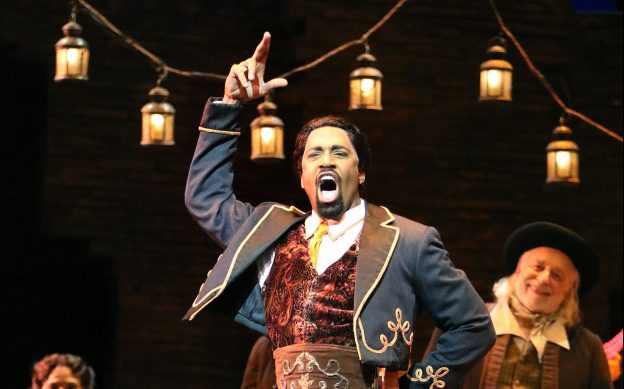
Star Advertiser TGIF: ‘Carmen’ themes ring true now
Look up the etymology of the name “Carmen” and you’ll find several definitions, from “song” (Latin) to “guard” (Hebrew) to “garden” (Spanish). But for the last 140 years or so, it’s really come to mean only one thing: George Bizet’s beloved opera, and the hot-blooded, seductress for which it is named.
Mezzo soprano Kate Aldrich, who portrays the gypsy siren in Hawaii Opera Theatre’s production opening Friday, thinks of Carmen as a modern woman.
“She’s very independent,” Aldrich said. “She’s very secure in who she is, and she has no problem with allowing herself to be vulnerable, to be honest. That is very attractive to people.”
Bizet’s work has proven indisputably attractive to opera lovers. Despite being panned by critics at its 1875 premiere, “Carmen” is one of the most frequently performed operas in the world. Many of its individual tunes, from Carmen’s slinky Habanera in the first act to the powerful Toreador Song of act two, have entered into the cannon of classical music.
The story, meanwhile, has proven timely and true to life, embodying love, jealousy and drama.
Presented by Hawaii Opera Theatre>> Where: Blaisdell Concert Hall
>> When: 7:30 p.m. Friday, 4 p.m. Sunday, 7:30 p.m. Tuesday
>> Cost: $29-$130
>> Info: 800-745-3000, ticketmaster.com, hawaiiopera.org
“‘Carmen,’ I think is very current,” said Aldrich, who has a sympathetic view of her character — comparing her to women who are victims of domestic violence in the present day, when men kill their partners over their desire to leave the relationship.
“It’s so often looked at as, ‘Carmen, this evil woman! She’s seducing these men and dropping them, and she made him do it. … It’s all Carmen’s fault.’ It’s not. That’s really an abusive mentality,” Aldrich said.
“CARMEN” TELLS the story of troubled soldier Don Jose, who is drawn to the gypsy Carmen. She falls in love with him, and also manipulates him to her own benefit at the same time.
It’s hardly a match made in heaven. Guest director Tara Faircloth calls them “the worst possible couple that you could put together.”
Carmen “does not want to be controlled,” Faircloth said. “She’s all about liberty and being who she is, and he’s all about wanting to control her.”
For Faircloth, the challenge of “Carmen” is not just in presenting an intense drama. “Carmen” is a “huge” production, requiring stellar performances from the entire cast.
“The chorus is on stage, like, 85 percent of the time,” she said. “There’s more chorus in Act One of ‘Carmen’ than there is in most other operas, and it’s realistic. It’s not like some operas, where they just walk on and hang (around), and be merry villagers and go away.”
Aldrich, who is playing the role for a fifth time, is fast becoming recognized as the Carmen of our time, winning accolades for bringing “raw emotion and defiant intensity to her singing,” as described in a 2010 New York Times review.
For the singer, the role is challenging and fun. Carmen’s famous Habanera, known properly as “Love is a rebellious bird,” is “tricky, because you are going through a couple different sections of the voice that we have what we call passaggios (breaks). It shifts through zones, so you have to move through them in a clever way,” she said.
Aldrich sees Carmen as a complex character who is tempting the tragic fate that her tarot cards portend.
“She’s playing around with how much wiggle room there is in her fate — in a sense seeing who’s more powerful, fate or her own essence,” Aldrich said. “So it is a game of cards, playing with fate.”
Tenor Kip Wilborn, who plays Don Jose, views his character as a man trying to escape his troubled past by joining the military.
“He’s the one who makes the emotional and dramatic journey from being someone who has made some mistakes and is trying to get his life back right,” Wilborn said. “Then insert Carmen, and things start unraveling.”
Jose’s big aria is the Flower Song in Act Two. It’s a touching tune in which he tells Carmen of how his feelings for her were kept alive by a flower she gave him: “And then he says ‘Carmen, I love you’ and she says ‘No, you don’t love me.’ And then she starts working her magic and pulling him in.”
COMPETING WITH Don Jose for Carmen’s attention is the bullfighter Escamillo, played by bass baritone Darren Stokes in his HOT debut.
“I get a parade and everything. I’ve never had a parade!” Stokes said.
Despite being considered, in modern terms, a “player,” Escamillo is still vulnerable to Carmen’s manipulations. “Carmen is like, ‘I notice you, but I want you to notice me.’ She entices him like she does Don Jose.”
Escamillo, of course, sings the Toreador Song, a particularly difficult tune for bass baritones because of its high range. For Stokes, who sang in church as a youth but did not take up singing formally until after college, it’s provided some important lessons.
“The very first time I sang the Toreador Aria, when I got finished I passed out. Did not know how to breathe,” he said. “You’d be surprised that confidence can get you so far in life. Now, whenever I sing this opera I think, ‘Is this the time I fall on my face?’ And then when it’s over, ‘Naah, I guess not.’”
With flawed characters ranging from the vixen Carmen to the weak-kneed Don Jose and studly Escamillo, a wholesome girl-next-door character seems to be called for. In “Carmen” it’s Micaela, portrayed by Talise Trevigne. She’s a friend from Don Jose’s past who tries to reconcile him with his family and winds up trying to protect him from Carmen.
Trevigne, last seen here in 2015 as Pamina in “The Magic Flute,” thinks her character is stronger than most observers believe.
“Most people see her as the wilting flower and they’re so sad for her, but it takes a lot of courage to travel a long way and enter a band of soldiers and stand up to muggers and gypsies,” Trevigne said. “She’s a girl of tough stuff.”
Bizet died a few weeks after “Carmen” premiered to severe criticism and even outrage, so one wonders what revisions he might have made have made to increase its popularity. The version that opera lovers heard for decades, in fact, was doctored up by a friend, Ernest Guiraud, who turned some of the spoken dialogue sections into recitative sections, said guest conductor Derrick Inouye. A more recent edition has reverted to spoken dialogue, which is how this production will be performed, he said.
The opera itself is “like a hit parade of well-known tunes,” said Inouye, an assistant conductor of The Met. “It’s guaranteed the audience will love the music.”
Yet “Carmen” is more than the sum of its hits, with a complex score that accompanies the intense drama.
“If it was just wonderful pieces, I don’t think it would be such a staple,” Inouye said.
By Steven Mark, The Star Advertiser TGIF
